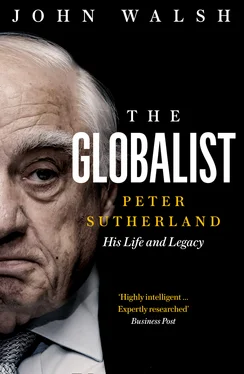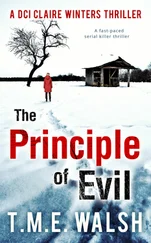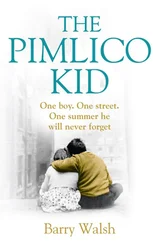Sutherland himself went on to captain Lansdowne in 1970, but retired from playing at the age of twenty-eight. According to O’Hagan he was never a star player as he needed to be bigger, but he has never played with anyone so driven. ‘I have never seen anybody so upset at losing a match. He just saw black. He would descend into a slough of despond, but neither have I ever seen anybody to be so elated when we won.’
SUTHERLAND WAS CALLED TO THE BAR IN 1968,and devilled – ‘devilling’ being the period of training that every new Irish barrister has to undertake – under senior barrister Harry Hill along with another ambitious young barrister called Michael Moriarty. Aged thirty-seven at the time, the dapper Hill had a reputation as being one of the finest barristers in the Four Courts. A keen cricketer, who never married, he had a predilection for good food and fine wine.
Sutherland picked up more than the law from his master. About a year after Sutherland had begun practising at the Bar, Fr Noel Barber asked Hill how his former pupil was doing. ‘Too well. I worry about him,’ he replied. A couple of years later, Fr Barber reminded Hill of his concern and he replied that he was wasting his time worrying. ‘Sutherland was going to the top.’
Hill would serve as Master of the High Court between 1984 and 2006, while Sutherland and his former master would remain close friends until the latter’s death in 2006. ‘Harry Hill never compromised his principles, or his opinions. He disliked above all posturing, cant and hypocrisy,’ Sutherland wrote in an appreciation that appeared in the Irish Times . ‘He sought to hide his light under a bushel, but what drove him fundamentally was personal relationships, sport and the Bar, probably in that order. Those who knew him know what a man of true quality he was.’[1]
Sutherland quickly established himself in the Law Library, the regulatory and representative body for barristers. David Byrne, who was called to the Bar in 1970, two years after Sutherland, and would also become attorney general (between 1997 and 1999) and a European commissioner (between 1999 and 2004), says that from the beginning Sutherland was ambitious, hard-working and very determined to be successful. ‘He was excellent. He was a charming, clever man and he had a capacity to make and keep friendships. He minded his friends. He just had that way with people that was very attractive, and as a consequence he was able to build a practice in the Law Library fairly quickly. He’d a very good style in court.’ Nicholas Kearns observed: ‘He [Sutherland] was born with ambition. He was like a heat-seeking missile. No matter what he did he was always going to do well. He was a formidable rival and competitor in court and outside it. If he couldn’t go around a problem he would go through it.’
Sutherland soon built up a lucrative civil law practice, helped in no small part by his father’s insurance business. Insurance defence work would have been the holy grail among barristers. There was much less work around for barristers in the 1970s than there is today, but equally there were many fewer barristers. ‘If you had connections with the law your start would be a lot speedier, and Peter’s father had been involved in the insurance industry. So that gave him a running start, because he would have gotten work in the personal injury area and work from insurance companies. That would have been a good help to him. And then of course he had a wonderful network of friends and people that he knew from school, from rugby and all of that. He was an excellent networker. He identified and made friends easily,’ another colleague from that era said.
According to former colleagues, Sutherland had a good court presence. In the Law Library there is a distinction between advocates and lawyers. Lawyers tend to be more academic, with an interest in how laws are formulated and how they relate to each other. Advocates are more drawn to the theatre of the courtroom and the gladiatorial nature of cases. Sutherland was very much an advocate. ‘Peter would have been much more interested in fighting the case, looking after the client and so far as you can, making sure that you win,’ says Byrne. ‘Therefore, if you were to divide barristers into advocates and lawyers, he would have been in the advocates camp. That isn’t to say he wasn’t a good lawyer. He was of course, but advocacy was his strong point and that isn’t surprising given his later career. He had great ability on his feet.’
John A. Costello, a former Taoiseach, gave a speech at the Law Library annual dinner in the early 1970s. Byrne recalls that, in making reference to the growing number of young barristers in attendance, Costello said, ‘You might be wondering what are the successful characteristics that are necessary to have a successful career at the Bar.’
‘I remember him saying you should fight every case as if it was your own and never write to the newspapers. They were the two bits of advice he gave.’ Sutherland would have followed those precepts without a second thought, says Byrne. ‘I’m not saying Peter was the only one who did that. That’s what barristers did for a living – it was their job. But Peter was quite relentless and had a lot of skill in how he would go about that.’ He was a formidable advocate. ‘You knew, doing a case against Peter, that everything and anything would be used against you for him to win that case.’
Nial Fennelly, a Supreme Court judge between 2000 and 2014, was a colleague of Sutherland at the Bar and acted with him on a number of cases. ‘I can’t remember him being on cases that made huge advances in law. He wasn’t on the human rights side of things like the late Donal Barrington [the former Supreme Court judge].’ But, says Fennelly, ‘He had a reputation of being very forceful as a barrister. He was always popular and well liked, but he was forceful and even aggressive as a young barrister making his way. He made a name from an early age at the Bar.’
The Law Library often appears a highly competitive environment, one that is riven with egos. A number of colleagues from that era say that Sutherland was one of the most competitive of all. Indeed, some of his tactics were legendary. One case pitted him against John Quirke, who would later become a High Court judge. They were good friends, but when Sutherland entered a courtroom friendships were left at the door. He and Quirke were appearing on opposite sides in a dispute between a landlord and a tenant, in a case heard in the Circuit Court by Noel Ryan. At one point, while the expert witness was giving valuations and evidence in the witness box, Quirke was on his feet, holding in his hand a report which he claimed vindicated his client, the landlord, and waving the report about with ever-increasing vigour.
The theatrics were getting too much for Sutherland. He leaned across, grabbed the report out of Quirke’s hand and sent it in the direction of the nearest bin. ‘The judge’s response was amusement and he didn’t admonish him. There was no row about it. Peter wouldn’t have done it out of aggression; it was more of a playful act. He got away with a lot of things by reason of his own charm, yet at the same time he would use his charm to get away with a lot of things,’ says David Byrne.
Alan Dukes, a former Fine Gael finance minister, recalls that even though Sutherland wore his ambition on his sleeve, his self-deprecating sense of humour had a disarming effect. Dukes recalls one story Sutherland told him about when he appeared before Judge Frank Roe defending a woman accused of shoplifting, not long after Sutherland’s less than successful attempt to win a seat in the 1973 general election. The defendant claimed that she was unable to feed her children because she had no home. ‘Frank Roe asked the woman would it help if she had a house. She said yes. He pointed his finger at Peter and said, “That man might be able to help you because he is a failed politician.”’
Читать дальше












